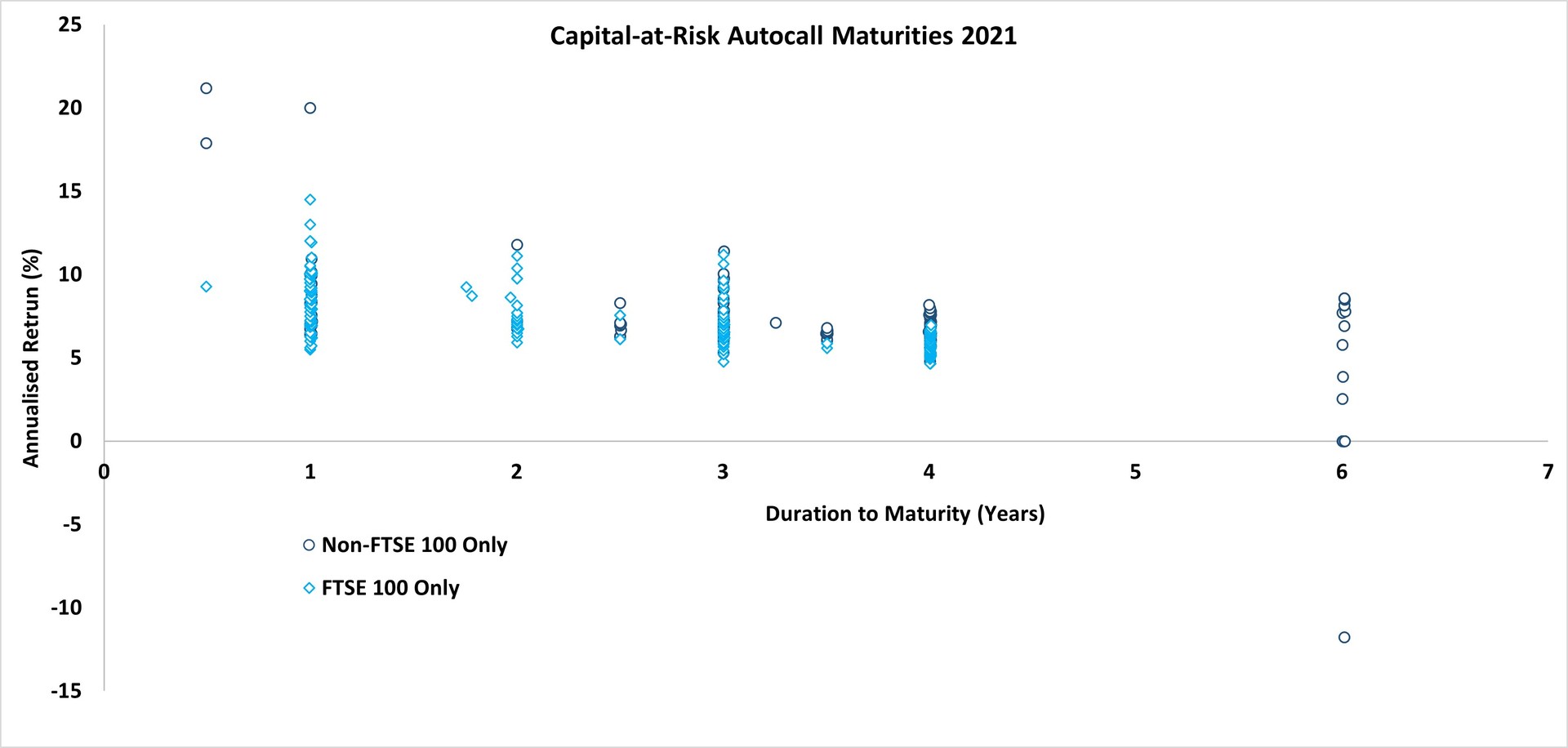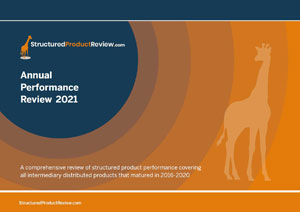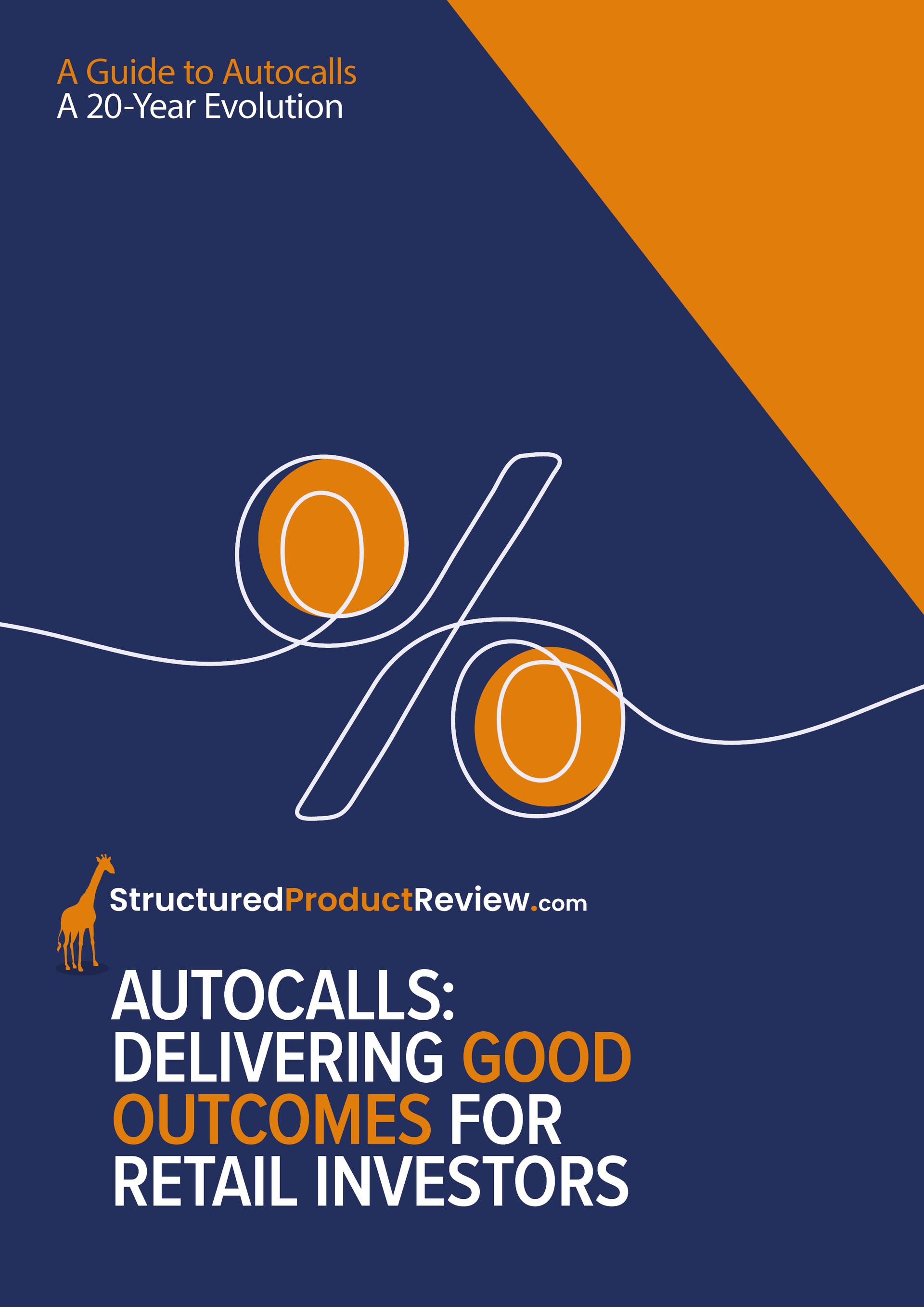09/02/2022
Since their first introduction in 2003, capital-at-risk autocall contracts have grown to be the dominant product shape in the UK structured product sector both in terms of issuance and subsequent maturities. Throughout 2021 395 such plans matured, representing three quarters of total maturities. This is in stark contrast to 2020, when the effects of the market correction meant that such maturities were deferred; in 2020 just 87 capital-at-risk autocalls matured, with the majority deferring their maturity to subsequent observations, assuming adequate market recovery.
More than half of the maturing capital-at-risk autocalls in 2021 were linked solely to the FTSE 100 Index, all of which matured positively returning investors an average annualised return of 7.23% over an average term of two and a half years.
The remaining 168 were linked to more than one index or baskets of shares and of these 159 produced their expected gains, eight returned capital only and one resulting in a capital loss. These plans returned an average annualised return of 6.85%, across an average term of three and a half years.
|
|
FTSE 100 Only |
Non-FTSE 100 Only |
|
Number of maturities |
227 |
168 |
|
Number generating positive returns |
227 |
159 |
|
Number returning capital only |
0 |
8 |
|
Number that lost capital |
0 |
1 |
|
Average duration (years) |
2.47 |
3.49 |
|
Average annualised returns |
7.23% |
6.85% |
|
Upper quartile annualised returns |
9.7% |
9.56% |
|
Lower quartile annualised returns |
5.45% |
4.16% |
It remains that no FTSE 100 only linked capital-at-risk autocall contracts have matured with a loss in the UK retail sector, with over 1,200 of such plans having matured; just eight of these maturities have ever returned capital only.
All eight of the no gain no loss FTSE only linked maturities commenced prior to the financial crisis, with the FTSE 100 Index failing to recover prior to their final maturity dates, however the capital protection barriers remained in-tact. It is noteworthy that these eight FTSE only products had maximum durations of five, or six years, and had this been seven, or eight years, all but one would have matured positively, on or before the final anniversary.
Over the recent history of the sector we had enjoyed a general increase in the maximum investment term offered on autocall products, however in the last year or so, there have been 59 five year products released – the first since 2015! For a full review of this trend, and our view of it, please reference the Lowes Annual Performance Review 2022.

The only loss-making capital-at-risk autocall contract in 2021 was linked to the performance three FTSE 100 shares, and lost capital as a consequence of a 52.92% fall in Standard Chartered Plc throughout the investment term.
The chart above illustrates the difference between FTSE 100 only, and non-FTSE only capital-at-risk autocall maturities, by annualised return and actual investment term. No FTSE linked contracts ran for more than four years, and even then, it is likely that they would have matured on previous observations if it weren’t for the black swan event in the form of a pandemic.
A function of the risk return trade-off is that the higher the risk taken when investing, the great extreme of return available – be it positive, or negative. In this instance, the additional risk is acquired through the selection of the underlying, be it through correlation risk where more than one is used, or increased volatility.
Despite a very small minority of unfavourable maturity results from higher risk trades, 2021 represented another successful period for the autocall subsector, and the structured product sector more generally. For further analysis of the products maturing throughout 2021, please reference the Lowes Annual Performance Review 2022.
Past performance is not a guide to the future.
Structured products place capital at risk.
Also in this section
- 2,000 and counting
- Q2 2024 maturity results
- 20 years of autocall maturities
- Product focus - June 2024
- Fixed income or interest?
- Maturities of the month - May 2024
- The barrier debate - revisited
- Product focus - April 2024
- Maturities of the month - April 2024
- Time to call
- I don't believe markets are ever too high for Structured products!
- Notes on counterparty exposure
- Return of Nikkei
- Q1 2024 issuance
- Q1 2024 maturity results
- Structured Products – AAAAAGH!
- Hop in CIBC
- Re-enter Santander
- How to build a financial fortune - revisited
- Issuance in 2023
- Where's the risk?
- Questionable offerings
- Challenging the case against structured products - 'Loss of dividends'
- Navigating the investment landscape
- Challenging the case against structured products - Counterparty risk
- 6-year autocalls approaching final destination
- 1,750 FTSE capital at risk autocall maturities
- The leopard that changed her spots
- Q3 2023
- Challenging the case against structured products - Keydata
- Dilemmas for UK IFA's and the unique role of Structured Products
- 'High charges'
- Precipice bonds
- Intro
- FTSE 100 Contingent Income
- Indexing the indices
- Something different
- Investing through volatility
- 100 10:10s
- The best or worst?
- The 10%/25% 'Rule' that never was
- Structured products and the yield curve
- Fixed income: Capital at risk?
- Prospects for UK inflation - and fun with A.I!
- The Barrier Debate
- More Deposits for now
- Last of the Americans
- What if?
- Time heals all wounds, we hope...
- How to diversify portfolios using structured products?
- The Proof Is In The Pudding...
- Debunking Structured Misconceptions
- 1,500 FTSE Capital-at-Risk Autocall Maturities
- Q3 2022 Maturity Results
- What do we prefer?
- Deposits vs Capital ‘Protected’
- There’s time yet…
- Where did you invest your clients?
- A Six-Month Reflection
- Return of the Rev Con
- Happy 2nd Birthday FTSE CSDI
- Q2 2022 Maturity Results
- The best and worst yet still the best
- Critique my Suitability - Mariana 10:10 Plan June 2022 (Option 2)
- 10/10 for 55 10:10’s
- Q1 2022 Maturity Results
- 'How to build a financial fortune': a follow up
- Critique my Suitability - Mariana 10:10 Plan April 2022 (Option 2)
- 2021 Capital-at-Risk Autocall Maturity Review
- An unwelcome return...
- CSDI's First Birthday
- Bon Anniversaire
- Introducing the FTSE Custom 100 Synthetic 3.5% Fixed Dividend Index
- Q3 2021 Maturity Results
- Critique my Suitability - Mariana 10:10 Plan October 2021 (Option 2)
- Blurring the lines...
- Beware of false knowledge; it is more dangerous than ignorance
- Good news, bad news...
- Certainty is Certainly a Benefit
- Critique my Suitability - Mariana 10:10 Plan September 2021 (Option 2)
- A Twenty-Year Progression
- Q2 2021 Maturity Results
- Nine 8:8s Post Positive Returns in Falling Markets
- Critique my Suitability
- Q1 2021 Maturity Results
- Morgan Stanley’s Marvelous Maturity Medley
Current Products
We review the UK's retail structured investment sector, providing pertinent support for Professional Advisers and relevant research tools.
View all ⟶


